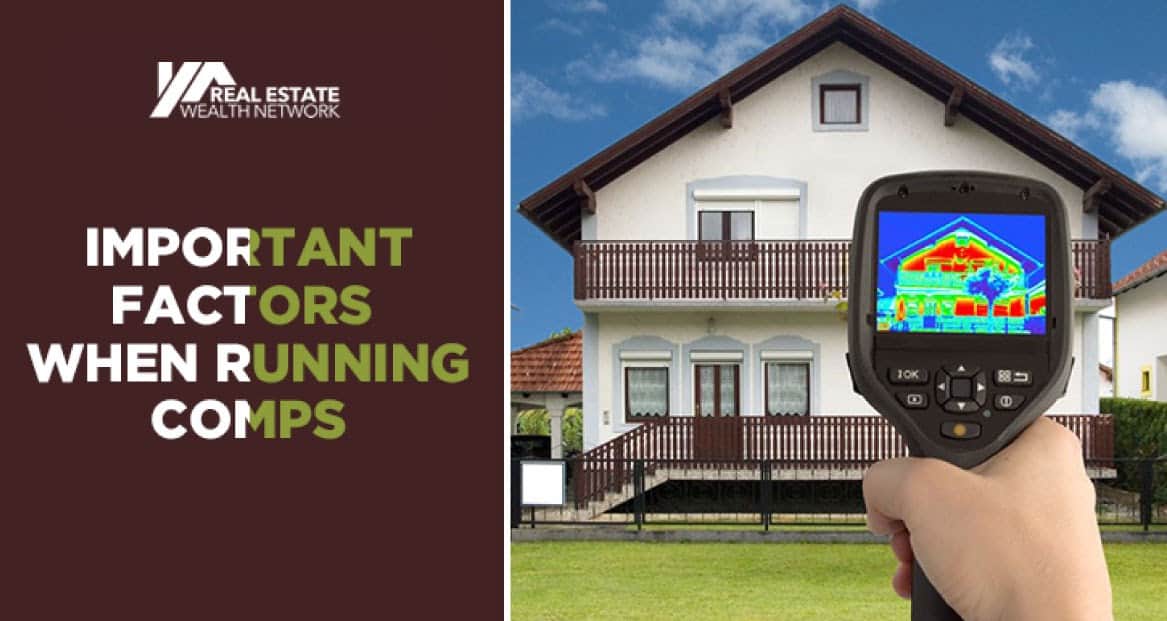
Sooner or later, you’re going to have to pull comparables on the properties you’re considering buying. It’s an important part of every successful Real Estate Investor’s day…
So let’s define a couple of terms before we dig into this…
First, the “subject property” is the one you’re considering buying.
Comparables are your absolute best tool to determine the value of the subject property. Real estate agents and investors like you and I will “run or pull comps”, to determine and justify the value of a subject property based on comparable properties that have sold recently within the area.
In other words, properties that are near by with similar square footage, similar number of bedrooms and bathrooms, possible upgrades and other considerations…
Now, there are lots of factors that help determine if a real estate comp is indeed comparable, and you need to know these factors and apply them each time you look at comps if you want to be able to arrive at an accurate “fair market value” or “after repair value”.
See, if you price your subject property based on a property that doesn’t make sense as a comp – you’ll end up overpricing or underpricing the property and either be outbid by a competitor or worse, pay too much. I don’t need to tell you that you don’t want to be in that position.
So, remember to consider these important factors when running real estate comps…
Proximity is Priceless
The first thing that makes a property comparable to your subject property is proximity.
How close is your comp to your subject property?
As a rule of thumb, real estate comps should be located within 1 mile (even less is better) from the house you’re trying to buy.
The closer your comp is to your subject property, the more relevant it will be. Ideally, you want your comp to be on the same street.
A house on the west side of town, for example, won’t be comparable to a house on the east side. It seems like common sense, but it’s definitely worth mentioning.
Same School Districts
If you can find comps in the same subdivision, same town, AND same school district, you are on the money my friend.
Pop Quiz: Can a property be in the same school district as the subject BUT not in the same town?
Answer: Absolutely.
If you don’t live in a rural area, this is probably a foreign concept to you, but I promise it is possible. So don’t be fooled simply because your subject is in the next town while in the same school district.
Keeping in mind what I just said about proximity… finding comps and subjects in the same school district is very important.
Date of Last Sale
Find out when your real estate comp was last sold…
If it was sold 2 years ago, it’s not going to be relevant and therefore not a comp, right?
A good comp will have sold within the last year. A better one will have sold in the last 90 days. The best comp is one that sold in the 30 days. Like proximity… the more recently it sold the relevant the comp.
If you find older properties, just disregard them. Finding comps is a process of elimination, and you want to narrow your comps down to the best 1 or 2 – 2 max!
Size Matters
You’ll want to look at both the house AND lot size along with the comp’s amenities.
The local Tax Assessor looks at the land and the “improvements” to the land, ie., the house and assigns an assessed value to each. With the house, the square footage is used as a part of the assessment process and is used by us in the process of determining value.. Ideally you want your comps to be within a difference of 100 square feet or less compared to your subject property. This way they’re so close, no adjustment for the difference in size is warranted.
I don’t recommend making “educated” price adjustments for a comparable that doesn’t meet the square footage criteria unless you consult with an experienced Realtor or Appraiser who truly understands the local market. If the comp is much larger or smaller than your subject, throw it out.
Beds & Baths
Obviously you want your comp and subject to have the same number of bedrooms and bathrooms.
Again, if they don’t have the exact same and your best comp has 1 more or 1 less bathroom, and you’re not personally and expert on values in your market, seek advice (like above) in making the necessary adjustment.
Why?
Because additional bedrooms and bathrooms are valued differently from market to market and then from neighborhood to neighborhood. Again, seek local advice on how much to add or subtract for bedrooms and bathrooms until you, yourself are that local expert.
Age & Construction
We’re talking aesthetics and bones here…

If your subject is a brick-front house, find a real estate comp with the same construction type and detail. You can’t (and shouldn’t) compare a vinyl-sided house to a brick house.
Styles should be the same and age should be as similar as possible. It’s not relevant to compare a house built in the ’90s to one constructed in the ’50s.
It would be cool to compare the two, no doubt, but not reasonable when we’re pulling comps.
Location, Location, Location
If your comp is located on a busy street next to a strip mall with a Walgreens next to it, it’s certainly not comparable to a house in a subdivision on a quiet cul-de-sac.
There are buyers for each no doubt, but it’s not reasonable to compare them to one another.
So, in addition to nearby (proximity) find comps that are located in similar types of areas to your subject.
Do Pools Always Increase Property Value?
The short answer is no. The long answer begins with that it depends on where you live.
Owning a property with a pool (and I’m talking in-ground pools only here; above ground pools are simply bags of water) in Florida will almost for sure increase the value and appeal of any house.
But having a pool in upstate New York will actually decrease the value of a property because of liability and maintenance concerns. So don’t always assume that properties with pools are worth more. Some times they are worth… less.
Final Factor
ALWAYS drive by your potential real estate comps, so you can be sure they are – in fact – comparable.
You don’t have to get out of your car, and I would suggest strongly NOT bothering owners by knocking on doors to take a closer look. You’ll know from the street if it’s truly a comp.
Just do a drive by, and if you’re looking at comps out of state, remember that satellite photos can be exceptionally valuable.
If you have any questions or comments regarding real estate comps or anything that we have discussed, please feel free to leave those below. I personally monitor and respond to them.
Best Regards,
Cam Dunlap
PS question… How do you presently pull comps? Share a comment or tip about your method below.
Cam.
Does one need to be concerned with issues of “economic” and “functional” obsolesence as it pertains to subject properties, and how do you account for this issue?
Thanks for the great information!
Thanks Cameron,
I appreciate the useful information and am just starring and considering IFlip to start with..any advice would be appreciated.
Thanks
Klaus Pankrac
This was some great advise. Thank you
You and the Cam Fam always provide top-notch content! You’re all truly a world-class organization! I was there last weekend with you all in Hasbrouck Heights. Wow what a weekend!
Whether you are an absolutely new investor or a seasoned deal machine the Rapid Results Investor Summit (https://www.realestatewealthnetwork.com/rapidresults/) weekend layed out the plan for our next moves and what tools to use to ensure leveling up is attainable.
Thank you Cam Fam!
Sara Malave &
William Murphy
Great Great info FROM EXPERIENCE!! Need it And APPRECIATE IT